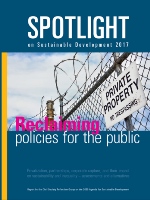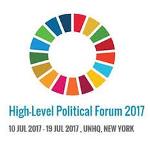Social Watch news
Published on Wed, 2017-07-12 08:52
Global spotlight report challenges the notion that “trillions of private finance” are needed to advance SDG implementation and highlights the centrality of public policies and investments, pointing out how developed countries’ refusal to any meaningful democratization of global economic governance remains the key obstacle to unlocking the necessary means of implementation
As the SDG 17 is under review today at the HLPF 2017, civil society groups express their concern for the inadequacy of the combined MoI/AAAA framework to match the ambition of the 2030 Agenda. The worrying slogan of ‘making the business case for sustainable development’, clearly exemplifies how private finance, rather than public policies and investments, is being portrayed as the fundamental key to SDG implementation, says the Spotlight Report, a comprehensive independent assessment released in New York on the opening day of the High Level Political Forum 2017.
|
Published on Wed, 2017-07-12 08:32
Global Spotlight Report says SDG2 is only achievable if present food systems change towards agroecological diversification and food sovereignty.
New York, 12 July 2017: SDG2 ‘end hunger, achieve food security and improved nutrition and promote sustainable agriculture, articulates one of the highest aspirations of the 2030 Agenda. Failure to advance it will significantly affect the entire agenda, claims the Spotlight report, a comprehensive independent assessment released in New York on the opening day of the High Level Political Forum 2017.
|
Published on Wed, 2017-07-12 00:00
New independent Spotlight report points out that women´s lower wages and poorer labor conditions have resulted in unfair advantages for corporations
New York, 12 July 2017: Corporate power threatens women´s human rights by promoting a race to the bottom in labour standards and avoiding taxes in the countries where profits are obtained, concludes the report Spotlight on Sustainable Development 2017, in its analysis of the fifth Sustainable Development Goal which promises to achieve gender equality by 2030 and empower all women and girls.
|
|
Source: 
. Published on Tue, 2017-07-11 15:09
Erradicar la pobreza extrema para el año 2030, una aspiración central de los Objetivos de Desarrollo Sostenible (ODS) de Naciones Unidas, es posible, pero sería necesario cambiar los actuales enfoques de política pública impulsados en el mundo, de acuerdo con un estudio.
Elaborado por una coalición de organismos civiles y sindicatos, el documento señaló que la erradicación es posible con los recursos económicos actuales en el mundo, pero las políticas públicas que podrían lograr ese propósito han sido severamente debilitadas en las últimas décadas.
|
Published on Tue, 2017-07-11 14:43
Global Spotlight Report says that the Agenda 2030 proposal to eradicate poverty by 2030 is achievable but tax policies need to change.
“The promise made by governments to eradicate poverty by 2030 is doable if countries cooperate to fight tax evasion and capital flights” argues an independent report submitted to the High Level Political Forum of the United Nations as an input to its debate today around the first of the Sustainable Development Goals (SDGs).
|
Published on Tue, 2017-07-11 10:48
The “leave no one behind” slogan and the proposition to increase funding “from billions to trillions” made by the development banks and the International Monetary Fund are the two policy messages most commonly heard at the debate around the Sustainable Development Goals (SDGs) that started yesterday at the United Nations. “You cannot have both at the same time” commented Roberto Bissio, coordinator of Social Watch, summarizing the analysis of the first SDG by the global Spotlight report, the major comprehensive independent assessment of the SDGs launched during the HLPF.
|
Published on Tue, 2017-07-11 00:00
This is not just about ODA but also about fighting tax evasion and recovering the assets stolen or illegally transferred to fiscal havens” said Roberto Bissio, coordinator of Social Watch, speaking on behalf of the Civil Society Financing for Development Group during an official session of the High Level Political Forum at the UN. Bissio said tax collaboration is essential and it should happen at the UN. Yet, there is a trend not to complement the Global Partnership but to substitute it with multiple PPPs that are non-transparent and not accountable. Recent Latin American experience additionally links PPPs with corruption on a massive scale.
Mr. Bissio participated at the Thematic review: "Eradicating poverty and promoting prosperity in a changing world: Multi-stakeholder perspectives" that took place on July 11, 2017 during the Highl-level Political Forum in the United Nations, New York.
|
Published on Mon, 2017-07-10 13:58

Photo: Maailma Kylässä
|
The government published the national implementation plan of the SDGs in February 2017. Economic growth and business opportunities are emphasized throughout the plan. Several CSOs have been critical about this approach because it will not reduce global inequality or help conserve natural resources for future generations. The economy should be a tool to achieve sustainable welfare and growth should not be seen an absolute value as such. Finnish CSOs have underlined that the social and ecological responsibility in businesses requires, besides dialogue, binding legislation. France and the Netherlands have legislated recently that businesses active in these countries must take care of human rights along the entire supply chain.
|
Published on Mon, 2017-07-10 13:55
Colombia’s National Development Plan 2014-2018 prioritizes the development of the different productive sectors, mainly the infrastructure sector, energy and mining, as well as hydrocarbons, encouraging the participation of private firms. The Colombian government proposes that the mining-energy and hydrocarbon sectors will play a key role in ensuring sustained and inclusive economic development, as they will generate significant resources to finance investments that serve to consolidate peace and fight against inequality. However, the productive sectors mentioned have been one of the main focuses of social conflict in the country because of their impact on human rights and the environment.
|
Published on Mon, 2017-07-10 13:39
Global report assesses how privatization and corporate capture have become obstacles to progress under the 2030 Agenda
New York, 10 July 2017: A global coalition of civil society organizations and trade unions presents today the report Spotlight on Sustainable Development 2017. It is published on the opening day of the High Level Political Forum at the United Nations in New York. The report provides the most comprehensive independent assessment of the implementation of the 2030 Agenda and its Sustainable Development Goals (SDGs).
|
SUSCRIBE TO OUR NEWSLETTER
Submit

|







